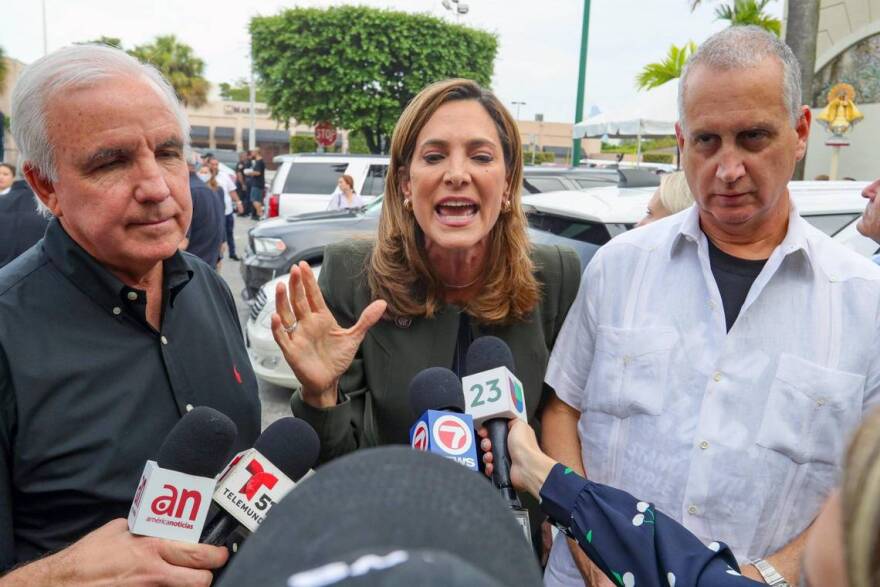From the Nostradamus bureau, here’s one of the biggest ironies of the 2022 midterm elections. The Democrats will fail to take back the Miami congressional seats they lost in 2020 — and it will be thanks in large part to the internet empowerment a Democratic president helped score for people in Cuba.
There seems little chance the Dems will unseat Republican Congressman Carlos Gimenez in Florida’s 26th District or GOP Congresswoman Maria Elvira Salazar in the 27th. Not as long as the two of them can capitalize on the emotional prospect of communist regime collapse in Cuba.
WLRN is here for you, even when life is unpredictable. Our journalists are continuing to work hard to keep you informed across South Florida. Please support this vital work. Become a WLRN member today. Thank you.
And that prospect hangs over the Florida Straits, realistically or not, because of the historically large anti-government protests that swept Cuba last month.
And the fuse that lit that protest powder keg was social media — angry, #SOSCuba cries for freedom and food in one town live-streaming through Cuban cyberspace and igniting even angrier cries from Havana to Santiago.
And the American who did much if not most to get that internet match into Cubans’ hands was former President Barack Obama.
READ MORE: BLM Cuba Statement Is a Blunder, But It Doesn't Mean BLM Movement Is Marxist
It was Obama who used his détente with Cuba — normalizing relations with the Castros in 2014 after 53 years of isolation failed to dislodge the Castros — to push the regime to wire the island.
It was Obama who, during his historic visit to Havana in 2016, shamed the Castros in front of the Castros’ 11 million subjects by insisting “the internet should be available across the island so that Cubans can connect to the wider world — and to one of the greatest engines of growth in human history.”
It was Obama who, with moves like ushering Google onto the island, did more than anyone to raise Cubans’ expectations that the regime would finally fork over the World Wide Web. Which it did. Slowly and grudgingly. But it did. That led to Cubans getting Twitter and WhatsApp and Facebook on their cellphones in December 2018 — and, months later, to their first social media-driven street protests in the summer of 2019 and more in 2020. Those were warm-ups for this summer’s unprecedented unrest — which was brought to you, btw, by a viral “Patria y Vida” video.
If Trump can claim his tighter sanctions weakened Cuba's regime, Obama can own his role in equipping the Cuban population with the tech tricks helping it get the better of that regime.
I point all that out not to sanctify Obama but to straighten the record — which right now is getting more twisted than a communist economics lecture as Gimenez, Salazar and the rest of South Florida’s Republican congressional delegation take to the Cuba stump.
I’m not shocked that they’re using a freedom movement in Cuba for brazen political gain in Florida. Both parties want a selfie with it. I won’t feign astonishment that since July 11 they’ve set up in Little Havana not only to vilify communists in Cuba — but to tar opponents in America as communists aiding Cuba’s communists. That’s simply what the Cuban exile-industrial complex does. That’s just Tuesday in Miami.
TECH TRICKS
Nor am I surprised they’ve shamelessly pilloried Obama’s normalization policy as a scapegoat for the six decades of Cuba frustration their approach has produced. As if to say: “If those two years of Obama engagement hadn’t interrupted our half century of flop, Cuba’d be free now!”

Obama's engagement policy was right but hardly perfect. And supporters of the tougher Cuba policy of his Republican successor, former President Donald Trump, can claim it’s weakened a decrepitly dogmatic regime and thereby emboldened a youthfully post-communist population. What’s not debatable, though, is Obama’s role in equipping that population with the tech tricks helping it get the better of the Cuban regime — and thereby helping the GOP get the better of Democrats in Florida.
No Republican pol would ever admit that debt to Obama. But even my Cuban-American friends here who support Trump’s tighter sanctions acknowledge it. “Obama expediting internet on the island has been effective much faster than 60 years of sanctions,” one in Hialeah told me this week. “It’s been key,” he said, to empowering Cubans — as has Obama’s policy of promoting Cuba’s fledgling but independence-minded private entrepreneurs.
We all want to see Cuba democratized tomorrow. But if it isn’t, and if it still isn’t next year, Republicans need to remember Cuban regime change is a long-haul effort. As Obama did — while he was helping Cubans connect to a long-term weapon of change.






